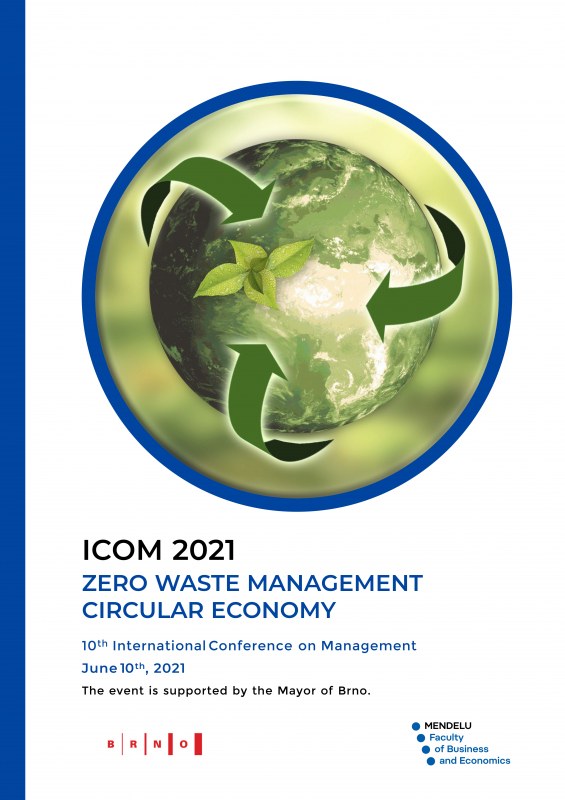
DOI: 10.11118/978-80-7509-820-7-0229
CONCEPT OF TALENT MANAGEMENT IN ENTERPRISES OF SLOVAKIA: FACTORS INFLUENCING STRENGTHS AND WEAKNESSES
- Radovan SAVOV, Pavol SKOČDOPOLE
Purpose: As a result of the dynamic environment and changes the concept of talent management has become very important topic in business organizations today. Company with talent management should meet better economic results. Talent management in business environment integrates strategy of the company, HR strategy, identification and recruitment, assessment, development, and retaining talents into complex process. Main objective of this research is to explore the current state of the concept of talent management realized in all phases of talent management in companies operating in Slovakia. According to the results main strengths and weaknesses are identified in the process of talent management.
Design/methodology/approach: Paper is focused on the factors of talent management process such a foreign capital, size of the company, economic situation, ownership, and existence of the HR department. A scaled questionnaire used in previous researches was used as a tool for data collection in 381 companies operating in Slovakia. Questionnaire reliability was verified by Cronbach´s alpha and reached the level 0.799. To verify the existence of statistically significant differences between individual groups of respondents the Kruskal-Wallis test and Mann-Whitney U test were used.
Findings: We found that foreign capital, economic results, and the existence of HR department are very significant factors influencing the level of talent management proces in enterprises. Identification of strengths and weaknesses in talent management proces were used for suggestions to meet higher level of the processes in management of searched companies.
Research limitations: Research should be extended to more companies to meet the requirements of representative sample. Results should be compared with other similar researches in other countries worldwide.
Practical implications: Each company can use self-evaluation of talent management according to the issues used in questionnaire. Main strengths should be used as a basic stone for personal strategy in companies. Enterprises should avoid mistakes of several companies that lead to weaknesses in the organizations because they have negative impact on economic results and development.
Klíčová slova: talent, management, process, strength, weakness
stránky: 229-237, Publikováno: 2021, online: 2021
Reference
- Bersin, J. 2013. Employee retention now a big issue: Why the tide has turned. Bersin by Deloitte, 16: 1-4.
- Bethke-Langenegger, P., Mahler, P., Staffelbach, B. 2011. Effectiveness of talent management strategies. European Journal of International Management, 5(5): 524-539.
 Přejít k původnímu zdroji...
Přejít k původnímu zdroji... - Boštjančič, E., Slana, Z. 2018. The role of talent management comparing medium-sized and large companies-major challenges in attracting and retaining talented employees. Frontiers in psychology, 9: 1750. DOI: doi.org/10.3389/fpsyg.2018.01750
 Přejít k původnímu zdroji...
Přejít k původnímu zdroji... - Craig, D. 2016. Transforming culture through personal and career empowerment. Industrial and Commercial Training, 48(2): 67-73. DOI: http://dx.doi.org/10.1108/ICT-08-2015-0054
 Přejít k původnímu zdroji...
Přejít k původnímu zdroji... - Daciulyte, R., Stankevich, K. 2015. A systemic approach to talent management: managers' perceptions versus employees'. International Journal of Business and Emerging Markets, 7(3): 223-236. DOI: 10.1504/IJBEM.2015.070337
 Přejít k původnímu zdroji...
Přejít k původnímu zdroji... - Egerová, D., Lančarič, D., Eger, L., Savov, R. 2015. Perspectives of talent management: Evidence from Czech and Slovak business organisations. Economika Management, 18(4): 108-120. DOI: 10.15240/tul/001/2015-4-008
 Přejít k původnímu zdroji...
Přejít k původnímu zdroji... - Froese, F. J., Shen, J., Sekiguchi, T., Davies, S. 2020. Liability of Asianness? Global talent management challenges of Chinese, Japanese, and Korean multinationals. Human Resource Management Review, 30(4): 100776. DOI: https://doi.org/10.1016/j.hrmr.2020.100776
 Přejít k původnímu zdroji...
Přejít k původnímu zdroji... - Holbeche, L. 2009. Aligning human resources and business strategy. Routledge.
 Přejít k původnímu zdroji...
Přejít k původnímu zdroji... - Krishnan, T., Scullion, H. 2017. Talent management and dynamic view of talent in small and medium enterprises. Hum. Res. Manag. Rev., 27: 431-441. doi: 10.1016/j.hrmr.2016.10.003
 Přejít k původnímu zdroji...
Přejít k původnímu zdroji... - Ready, D. A., Conger, J. A., Linda, A. Hill. 2010. Are You a High Potential?. Harvard business review, 88(6): 1-7.
- Silzer, R., Dowell, B. E. 2010. Strategic talent management matters. In: Strategy-driven talent management: A leadership imperative. Josses-Bass, pp. 3-72.
 Přejít k původnímu zdroji...
Přejít k původnímu zdroji... - Tansley, C. 2011. What do we mean by the term "talent" in talent management?. Industrial and commercial training, 45(5): 266-274. DOI: http://dx.doi.org/10.1108/00197851111145853
 Přejít k původnímu zdroji...
Přejít k původnímu zdroji... - Valverde, M., Scullion, H., Ryan, G. 2013. Talent management in Spanish mediumsized organisations. Int. J. Hum. Res. Manag., 24: 1832-1852. DOI: 10.1080/09585192.2013.777545
 Přejít k původnímu zdroji...
Přejít k původnímu zdroji...


